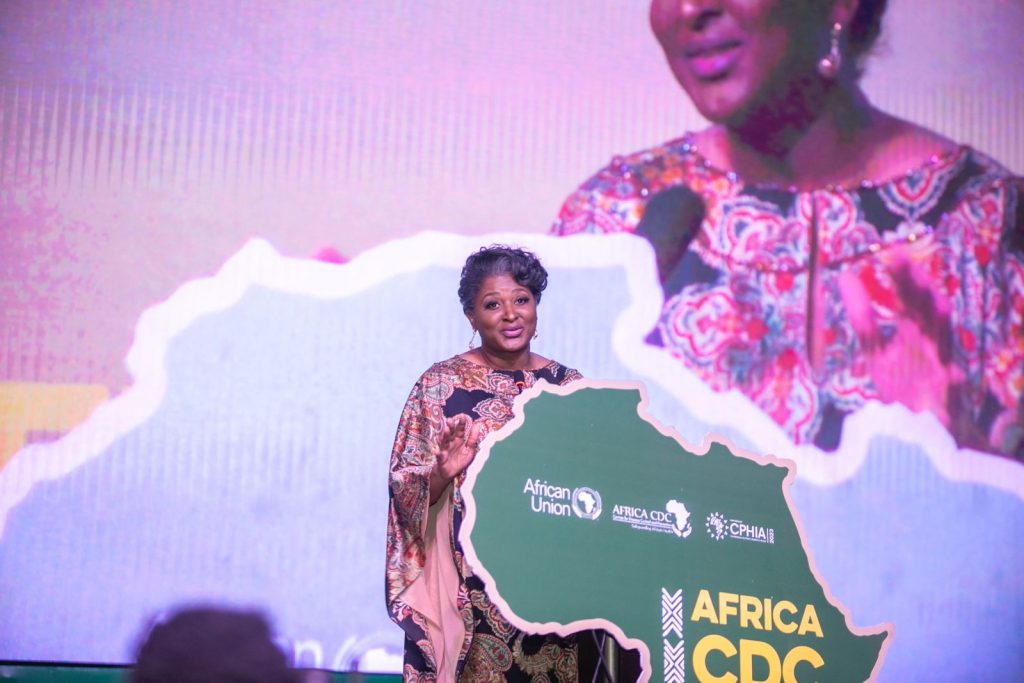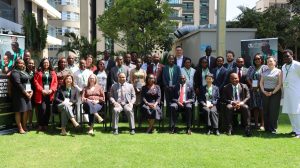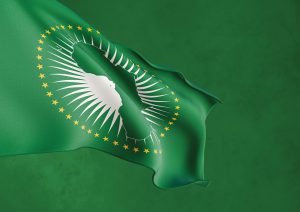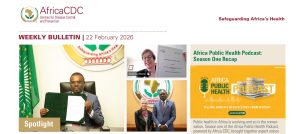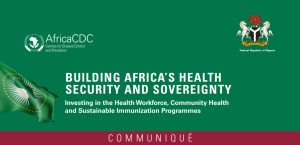I would like to start by thanking the government of the Republic of Zambia for the incredible hospitality extended to my delegation and I. Lusaka is a vibrant city and the ideal host for this Youth Pre-Conference. I would also like to thank my dear sister and friend, H.E Mutinta Hichilema, for the warm welcome, and her kind words during her Welcoming Address.
I greet you on behalf of the Organization of African First Ladies (“OAFLAD”), of which I am the President, and the First Lady of Zambia being one of the 43 African First Ladies who is a member. We are both here to acknowledge and support the leadership of AFRICA CDC in convening young people and ensuring they are not left out of the important conversations on how Africa intends to shape a new public health order.
OAFLAD is also engaged in what we call a unifying campaign. It’s a continent-wide campaign for gender equality that will be launched by First Ladies, in their respective countries, across the continent. The campaign will focus on the central tenant that WE ARE EQUAL. The focus will be on actions that can be taken to advance equality in the areas of gender-based violence, economic empowerment, education and of course, health. It would be an honour and a privilege to have youth advocates for this campaign, so please let US know if you are interested in being an advocacy partner. Just yesterday, I had the distinct privilege of being in Nairobi, where the First Lady of the Republic of Kenya hosted a very successful and well attended “We are Equal campaign” launch event, which enjoyed the presence of the President of the Republic of Kenya, senior government leaders, as well as 20 000 women from all over Kenya. That speaks to the convening power of First Ladies, and why OAFLAD chose to harness the collective advocacy strength of First Ladies to ignite and advance important societal conversations.
There is no place I would rather be than in this room with all of you today. CPHIA is Africa taking its destiny into its own hands, and the Youth Pre-Conference is how we ensure that the ideas and energy of young people are integrated into this consequential initiative. In addition to networking amongst each other, you also get to network with the rockstars of African public health, powerhouses like Dr Tedros from WHO; Michel Sidibe, the former UNAIDS head; Jean Kaseya, DG of Africa CDC; Amb. John Nkengosang, the head of Pepfar and former Head of Africa CDC; Professor Sennait Fisseha, Vice president of Global Programs at the Susan Buffet Foundation and chief advisor to the WHO DG; Dr Muhamed Ali Pati, the Minister of Health and Social welfare in Nigeria; Dr Matshidiso Moeti, WHO Regional Director for Africa; Githinji Gitahi, CEO of Amref Health Africa; Dr Kesete Amasu, CEO of Big Win Philanthropy and former Minister of Health in Ethiopia; Dr Magda Robala, president of
These are people you will meet in the corridors. When you see them, please do ask for selfies, as I am sure you will – but also introduce yourself, and your work. Those are your future bosses. Those are the people whose roles you will be taking over one day so they should at least know your name.
Those African public health rockstars are the people whose career paths you should understand and follow. They are also the people who you want to watch how they wield power. [A case study is Dr Tedros and how he has handled the complex and contested issues around Tigray, and Gaza]. These powerhouses in public health are not presidents, and many are not politicians, but they are political. They have access to Presidents, they have institutional powers of their own, and you may want to want to watch how they use their power and proximity to advance Africa’s public health agenda.
Many of you may wonder where you fit in the politics of your respective countries. Some of you may be politically engaged in ruling or opposition parties, and some of you may have given up hope or prefer to be politically neutral for a variety of reasons. I understand those nuances and the exceptions to this statement. There is no right or wrong path because you don’t need to be a politician to lead. As a matter of fact, you don’t need anyone’s permission to lead. However, I want you to consider that politics decides who gets what, and how. Public health is political. The public health rockstars I mentioned are all political creatures. They may not want to be, but to be effective, they have to be. Many even needed political support from their countries to be appointed to the jobs they have now.
Kwame Nkrumah is known to have paraphrased from the bible when he said, “Seek ye first the political kingdom and all else shall be added to you.” The politics-first approach recognizes that politics decides who gets what, and when. If you are not a politician and do not aspire to be, that’s a perfectly fine choice. You, however, don’t have a choice in needing to be political. Politics influences the lives of people. Public health is about people. To get them what they need, when they need it, you must be able to influence politics and politicians.
The Government is required to solve society’s most complex problems. We need our best brains at the table. Who ends up at the table is often determined by politics. This is how many of you are often led by people you went to school with who never paid attention in class.
Whether your power is community mobilization or mandated power from elections, power is power. It is important for those who seek power, whether activists or politicians, to analyze their motives. Activists who end up trading their community power to seek political power without having a plan often end up behaving worse than the politicians they once opposed. Never seek power, any form of power, for the sake of it. Have a plan of what you want to do with it, and stay faithful to that plan, no matter what. As young people interested in public health, your motives are clear: It’s for public health. Public health is political, and to change people’s lives, you do not need to be a politician, but you do need to be politically savvy.
This is why it’s essential that you are here. Youth have power. You need to be able to leverage that power. Each generation sees the world differently, and for your vision and dynamism to shape the future of public health, it must first be seen. Thank you, Africa CDC, for seeing the power of the youth.
As a First Lady, many people see me but don’t really see me. Their eyes are fixed on the power of the President. Has anyone ever shaken your hand without looking at you? That’s what happens to me all the time. I walk behind my husband and I must shake hands after he has passed. Many shake my hand without looking at me. I don’t mind, I understand that power, and proximity to power, is not the same thing.
I also understand that sometimes, not being seen is a superpower as you can watch people silently, without them noticing you are watching. I have a front-row seat in observing how people use their power, and how they act around power. All of you interact with power every day. There are some situations where you have the power and other interactions where you are powerless. The rockstars I referred to have power and some of you are in proximity to that power.
I don’t have power; I have proximity to power. I know what that means and what it doesn’t mean. A lesson I will share during my presentation later on adolescent health is the decision you make around how you use proximity to power. Do you use it to empower yourself and those around you, or do you use it to empower the powerless? Please don’t waste your proximity to power for selfies; because proximity is power in itself, so use it wisely.
I have this discussion of how to leverage politics and power often with young people in Namibia and across the continent, and I am pleased to have it with you today. Not everything on these topics can be said on public platforms, so I look forward to engaging many of you away from the microphones. I feel this is my duty to youth because I have seen how many have been sucked into, and spat out of political circles without optimal usage of their talents.
I have a particular fondness for young people in public health as I understand, as you do, that when public health policy and practice gets it wrong, people die. When public health gets it right, people live. Simply put, being effective at what you do is a matter of life and death.
In recognizing your value and potential as youth, we also recognize the value of partnerships. The journey of youth progress is a collective journey. It is a collaborative effort that requires the alignment of governments, organizations and the driving force of youth-led initiatives. I come from a country committed to fostering partnerships that amplify the voices and contributions of our young people. The Zambian government is known to do the same, and I am proud of Africa CDC for also centering young people in its initiatives.
Our continent faces unique health challenges, from infectious diseases to maternal health and mental well-being. The burden of these challenges falls squarely on the shoulders of the youth. This is why we must empower the youth to be the architects of the solutions and to take charge of their health and the health of their communities.
The youth pre-conference serves as an ideal platform for dialogue, idea exchange, and cultivating relationships, networks, and knowledge. It is a testament to our shared commitment to building a healthier Africa.
Initiatives like the Bingwa Initiative, which focuses on youth engagement and empowerment, are a testament to the tireless efforts of AFRICA CDC in recognizing the importance of youth engagement in public health.
Africa CDC is intentional about harnessing the transformative power of young people and, together with the Youth Advisory Team for Health, we look forward to the impact of this partnership. Dr Kaniki and your team, I have seen your incredible passion for the work that you do and your work ethic; it is inspiring and a reminder of what young people can do when trusted with positions of authority. Young people rely on you to succeed. Thank you Dr. Kaniki for the incredible leadership you have shown.
To the young public health professionals here, I extend a call to action: your energy, creativity, and commitment are the driving forces that will propel us towards a healthier future. You do not need anyone’s permission to lead. Become advocates and provide leadership for health within your communities.
The transformative power of innovation and technology cannot be overstated. I challenge each of you to harness the tools at your disposal for creative solutions to our health challenges.
As we engage in the discussions over the next two days, I implore you to actively participate, contribute, share insights and propose actionable solutions. The Africa CDC Youth pre-conference is not just a gathering. It’s a collective endeavour to shape the public health narrative on our beloved continent.
In closing, I would like to express my sincere gratitude to each of you for your commitment in advancing public health in Africa. I also thank the organizers for creating a platform that centres and amplifies the voices of young people. Public health is not easy. Social, political, religious and fiscal determinants of health impact access and equity to health. There is also you, the people who understand that our health is interlinked and must be accessible and equitable for everyone. This is how we build a healthier and more resilient Africa. Thank you.

